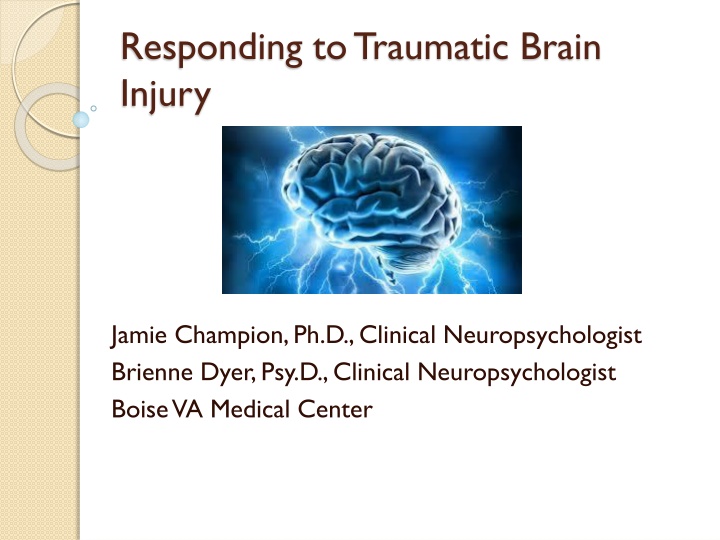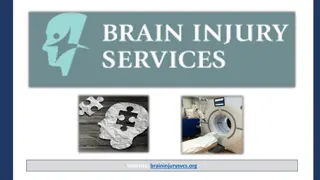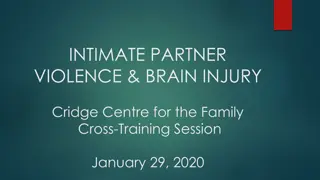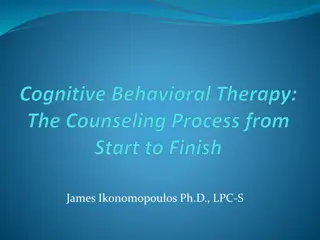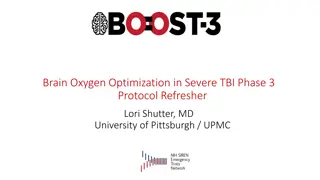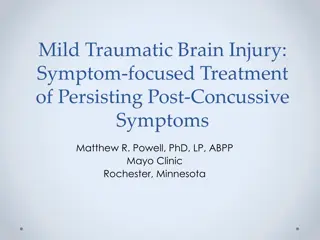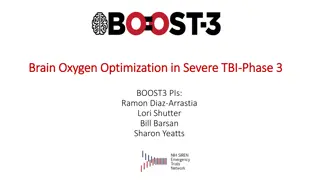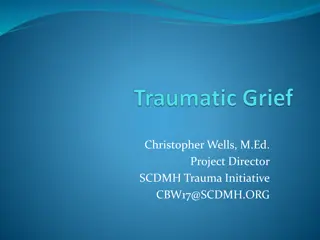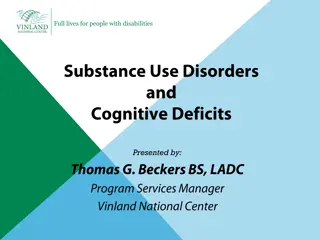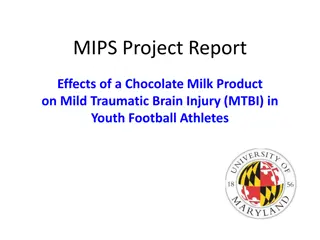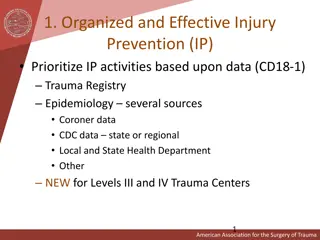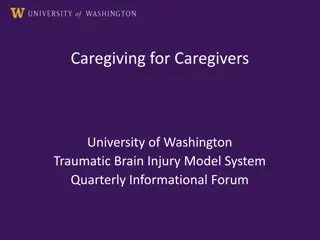Cognitive and Behavioral Management Strategies for Traumatic Brain Injury Patients
This presentation focuses on addressing challenging cognitive, behavioral, and personality issues associated with traumatic brain injury (TBI). It outlines cognitive issues such as attention, speed of processing, learning, memory, and executive functioning. Cognitive management strategies include techniques for attention, speed of processing, learning and memory, and organization and problem-solving skills. The vignette highlights a case of a 32-year-old male with a history of ADHD, multiple mild TBIs, and substance abuse, illustrating common challenges faced by TBI patients. The importance of individualized support and practical strategies to promote successful outcomes are emphasized.
Download Presentation

Please find below an Image/Link to download the presentation.
The content on the website is provided AS IS for your information and personal use only. It may not be sold, licensed, or shared on other websites without obtaining consent from the author.If you encounter any issues during the download, it is possible that the publisher has removed the file from their server.
You are allowed to download the files provided on this website for personal or commercial use, subject to the condition that they are used lawfully. All files are the property of their respective owners.
The content on the website is provided AS IS for your information and personal use only. It may not be sold, licensed, or shared on other websites without obtaining consent from the author.
E N D
Presentation Transcript
Responding to Traumatic Brain Injury Jamie Champion, Ph.D., Clinical Neuropsychologist Brienne Dyer, Psy.D., Clinical Neuropsychologist Boise VA Medical Center
Outline Review challenging cognitive, behavioral, and personality issues associated with TBI Discuss management strategies Vignette Problem-solve your real life examples
Vignette Mr. B- 32 year old male with history of ADHD, multiple mild TBIs (concussions), and methamphetamine and alcohol abuse. Presents as anxious, agitated, scattered, impatient, fidgety. Has trouble focusing, following through, managing time. Often misses appointments then becomes frantic in attempts to make up (e.g., may show up unannounced). Struggles to keep up with regimented schedule and feels like others are setting him up for failure. He often uses curse words and had a hard time controlling his temper. How can we help him be successful in the program?
Cognitive Issues Attention Speed of processing Learning and Memory Executive Functioning (higher order organization and problem solving skills)
Cognitive Management Strategies Attention and Speed of Processing Focus and refocus person s attention as needed Restructure environment to reduce distractors Slow things down
Cognitive Management Strategies Learning and Memory Have individual repeat what was said, write notes Provide material in multiple formats (visual, verbal, hands on) Provide frequent reminders Have individual use external cues (planner, cell phone reminders, alarms)
Cognitive Management Strategies Organization and Problem Solving Skills Routinize daily activities Use checklists Implement structure Use external aids to enhance organization Help the individual plan ahead and problem solve difficulties that may occur
Behavioral Issues Impulsivity Disinhibition Difficulty attending to social cues Planning Judgment
Behavioral Management Strategies Reinforce desired behaviors, ignore undesired Remain calm Do not challenge person Validate emotions Be explicit Help individual learn from past mistakes in decision-making
Other Issues Preexisting Personality Issues that Might Complicate TBI Style: Manipulative, habitually disregards/breaks rules, aggressive, indifferent to effect on others Strategy: Firm rules, consequences. Need to check on everything they say, monitor Style: Submissive, clinging behavior. Needs frequent reassurance, goes to excessive lengths to obtain support Strategy: Frequent brief contacts with problem solving. Be supportive but encourage independent, solution focused thinking
Other issues Preexisting Personality Issues that Might Complicate TBI Style: Grandiose sense of self-importance, sense of entitlement (unreasonable expectations of especially favorable treatment or automatic compliance with his/her expectations), lacks empathy about how behaviors affect others. Strategy: Comment on the problems/attitudes in a supportive manner . Encourage more realistic views of themselves, the situation, and their expectations. Style: Emotionally labile, impulsive, alternate between needy and angry, mood is reactive and variable Strategy: Stay calm, do not react to their internal dyscontrol, focus on problem-solving and not chaos, acknowledge feelings but redirect to behaviors/desired outcomes, simplify break into chunks
Other Issues Fatigue and sleep disturbance are two common disabling symptoms that affect recovery from TBI
Vignette Revisited Mr. B- 32 year old male with history of ADHD, multiple mild TBIs (concussions), and methamphetamine and alcohol abuse. Presents as anxious, agitated, scattered, impatient, fidgety. Has trouble focusing, following through, managing time. Often misses appointments then becomes frantic in attempts to make up (e.g., may show up unannounced). Struggles to keep up with regimented schedule and feels like others are setting him up for failure. He often uses curse words and had a hard time controlling his temper. What are the presenting cognitive, behavioral, and personality issues? How can we help him be successful in the program?
Problem Solving What issues have you encountered in working with individuals with TBI? What cognitive, behavioral, and/or personality traits are challenging for you? What have you found to be effective in managing these issues?
Vignette #2 Ms. Q- 50 year old female with history of 35 years alcohol abuse, domestic violence (including several head injuries), and bipolar disorder. Presents as irritable, defensive, dependent, highly emotionally labile. Has difficulty remembering important details of conversation, often misinterprets statements by others and becomes offended, feels overwhelmed by program requirements, often seems helpless by others and requires a lot of extra effort to keep on track. How can we help her be successful in the program? What are the presenting cognitive, behavioral, and personality issues? How can we help her be successful in the program?
Resources If an individual appears to need additional assessment of abilities, a neuropsychological evaluation may be appropriate Occupational/speech therapy can help improve compensatory skills
Contact Information Jamie.Champion@va.gov Brienne.Dyer@va.gov Please feel free to email us if you have any questions!
